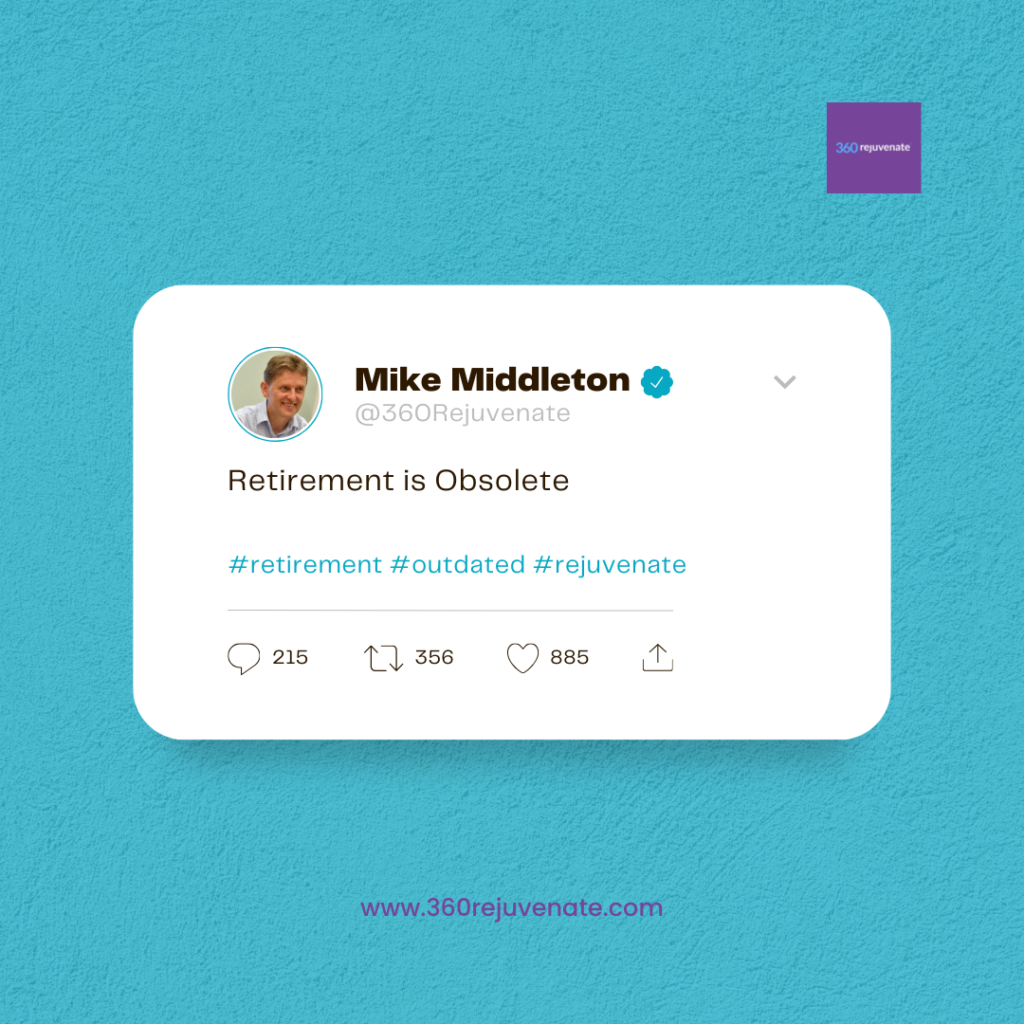Or it soon will be.
Retirement as we have come to understand it was conceived to solve a work problem. Too many old
people working and too many unemployed young men. The time was 1889.
Think about the date for a moment, we are following an idea that is largely unchanged since its
conception nearly 134 years ago. What else are we following that owes its origins to the Victorian
era? Let’s ignore education for now, this is meant to be a post not a book!
At one time there was a purpose to retirement in a society where employment in coal mines and
heavy industry left those that lived long enough to get to reach their mid-sixties, completely worn
out. We had to find a way to help them live their final years in some sort of relative comfort. Add to
this the need to find enough work for the young as the baby boomers sort to find their place in the
world.
This has all changed. Aside from rising longevity, over the last forty years western societies have
rotated away from heavy industry based economies to one dominated by services. Manufacturing
has evolved into a cleaner less dangerous environment where machines increasingly do the heavy
lifting and more dangerous jobs. Even without medical advances life expectancy would have risen as
far fewer people died at or because of work.
Changes in the way we work, indeed the very idea of work itself are happening at an ever
accelerating pace. Although Governments and large employers have been slow to respond the
growing trend to find different ways of working can be traced back many years.
Management consultants McKinsey in a 2016 report commented “Overall, we estimate that the
independent workforce is larger than previously recognized”, at the time the report was published
McKinsey estimated that 162 million people in the US, the UK and EU were working independently
or in the gig economy.
It is worth bearing in mind the data used is now close to nine years old and in the meantime we have
had the seismic workforce shock of the pandemic.
In 2009 I was introduced to two young entrepreneurs, they lived at opposite ends of the country but
had been collaborating on a side project for a couple of years whilst maintaining their full time jobs.
The new business was producing decent revenue, had an almost zero cost base and was capable of
being managed in just a few hours per week. By 2010 they had both left their full time jobs to work
on their new project. In addition to the original online business over the next few years they experimented with a few additions, two of which worked well. As a result of the way the businesses
were set up, and as neither had a desire for a flamboyant lifestyle, they took only small incomes
from the business. Savings and investments accrued and by their mid thirties both were well on the
way to financial independence. They have no fulltime employees beyond themselves using range of
contractors and freelancers instead.
Traditionally some might call their business a lifestyle business, almost in a disparaging way,
however, to do so aside from being patronising, fails to recognise the economics of what is really
going on.
To keep this short, to generate the lifestyle and revenue they had (this is ten years ago) from
invested capital would require somewhere between £4 and £5million, not bad for a couple of guys
working part time. They are not alone in seeking this route to earning, indeed the sector is ballooning.
Aside from the obvious impact on things such as income tax (they hardly pay any) and what this means for society, in one shape or form this business can continue if they wish, for decades to come. They are unlikely to reach age 65 and be worn out in the way their grandparents were, quite the opposite.
Whilst there remain issues of funding for some people currently in retirement and those not far
away, huge numbers of people will not need to enter retirement, increasing numbers will simply opt
not to. Retirement will render itself obsolete.
Rapidly adding to this change is of course artificial intelligence (AI) and the impact this will have on
the workplace. Who knows when robots will be capable of doing the delicate work currently the
preserve of humans, but one day they will. We already know that AI will replace many white collar
jobs in the coming years, to some people this is all rather frightening.
No doubt the tech revolution will bring with it some downsides as every new technology has done,
but the upsides for humanity will far outweigh the risk. In a sense it really doesn’t matter whether
you agree, disagree or don’t like the idea, it’s too late the genie is out of the bottle.
With these changes to the workplace, how and when we work, how long for and doing what there
can be no doubt retirement will soon be a thing of the past.
For large numbers of us life may well become a quest for one meaningful endeavour after another
liberally sprinkled with sabbaticals rather than a long career to be followed by a twenty year
retirement.


